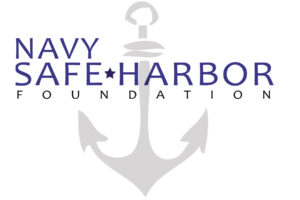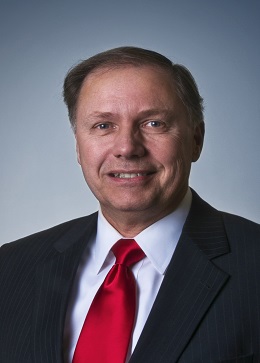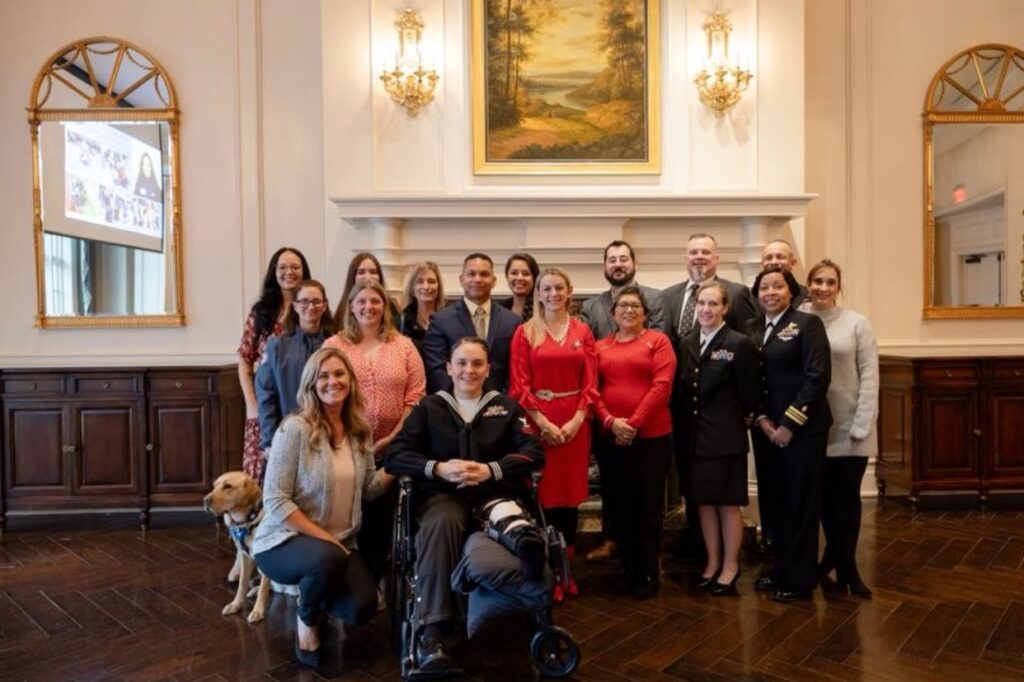
Sitrep
January 2024 Vol. 14
New Years is traditionally a time for reflection. A time when we look back and evaluate how we did on our goals and resolutions. The Navy Safe Harbor Foundation is no different. Assessing our work and the impact and benefits it brings to wounded, ill, and injured Navy and Coast Guard Sailors is one of the ways we know we are meeting our mission. So, how do we evaluate the success of our work? We can always look at numbers. Numbers tell us how we used your donations. They tell us where we started and how we got to the present.
In 2023, we filled 32 requests for financial support from the Navy Wounded Warrior (NWW) program. Six of these requests were group requests for support of veterans participating in the Warrior Games: camps, trials and the Warrior Games Challenge. In total, we helped 32 athletes on their way to participate in the 2023 Challenge. We hosted a Caring for the Caregiver event and filled 25 requests for Family Support. In total, we provided over $100,000 in grants this year, all focused on reducing financial burdens encountered while a Sailor was adjusting to their new normal. We can also assess the programs themselves and consider the types of help we have provided to individual enrollees.
In our Family Support program, we filled six requests for medical devices denied by insurance. Each of these requests aimed to treat symptoms experienced post-head trauma. Five of the family support requests assisted with travel and lodging costs accumulated by caregivers and family members who attended to their Sailor during hospitalization and treatment. Rent and mortgage requests were filled five times when paperwork snafus caused interruptions in pay. Three Tuition requests were submitted by NWW when Sailors were medically retired and no longer qualified for DoD tuition reimbursement. A house modification for ease of access, moving costs related to a medical rating determination, and retrieval of a car towed after a medical emergency while driving are examples of rarer support requests NSHF provided during the year.
Our support of the NWW Adaptive Athletic program allows veterans to participate when lodging, food, and transportation is covered. This year the Invictus Games were hosted in Dusseldorf, Germany in September. NSHF supported two veterans participating on Team Navy. Our annual Caring for the Caregiver event occurred over three days in November. Eight caregivers shared their stories and found some relaxation and resources to help them in their role as caregivers and in combating caregiver fatigue. While the numbers and the specific grants filled tell us many things, the ultimate test of a program is the Sailors themselves and what they say about our programs. Family members who are able to join their loved one during treatment share that the closeness and act of providing physical care when their Sailor is in a vulnerable position eases their worry and strengthens their own resolution. Often we hear from Sailors that the reduction in financial stress allows focus on self and increases the drive to move forward on their new path.
Caregivers who attend our Caregiver program often mention how much good the bonding with other caregivers brings. They feel seen and heard when they spend time with others in similar situations. The athletes report gaining a renewed sense of self and personal strength when they find physical success through sports, especially when they felt that that success had been lost. By all of these measures we consider 2023 to be a success. We know that that success has been achievable because our donors are loyal and generous. We appreciate you and look forward to the year ahead working to help Sailors together.
Thoughts From Our Board
Rear Admiral Jeff Hathaway, USCG, (ret)

It’s a new year and many of us will start by setting personal and professional goals. Some of those goals are attainable, some are simply pipe dreams. For many of those enrolled in Navy Wounded Warrior (NWW), getting through each day is the only goal that matters. Serious injury or illness has launched them on a quest to determine what their “new normal” will be. But with the assistance afforded by Navy Wounded Warrior and the Navy Safe Harbor Foundation (NSHF), many severely injured or ill Navy and Coast Guard sailors are pursuing a “new normal” that they never thought would be possible.
The Navy Wounded Warrior program has over 7,600 Navy and Coast Guard sailors enrolled. Each is assigned a non-medical care
coordinator who also monitors the medical services they are receiving through either military or VA hospitals. This program strives to achieve their motto of “Never to Sail Alone.” While medical treatment is normally delivered at no cost to a sailor, the non-medical costs associated with achieving a sailor’s “new normal” are not. That is where the Navy Safe Harbor Foundation comes into play. Our NSHF all volunteer cadre of board directors and helpers are either military veterans ourselves or otherwise have close ties to the rigors of military service. Sailors accept long deployments and oftentimes dangerous working conditions as “part of the job.” But we also know that most military members “suck” at asking for help when they truly need it. But once enrolled in NWW, and a sailor’s non-medical needs come to light, we want to make sure that NSHF is always there to help. Our memorandum of agreement with NWW, makes that happen. NSHF is proud that we have supported every validated request that has come to us through the years. NSHF support of non-medical needs comes in all flavors. We have flown parents or spouses to be by the bedside of a loved one after a grievous injury; supported the customizing of homes or vehicles to accommodate sailor needs; sponsor caregiver support workshops; fund equipment, training and travel for veterans participating in Navy sponsored adaptive athletics. All of these things, and more, are critical to the recovery process of a wounded warrior or to helping them achieve a “new normal” that they may not have envisioned as possible. Most importantly, NSHF wants our severely injured or ill Navy and Coast Guard sailors to know that they will never sail alone in their time of greatest need.
Your continued individual and corporate support makes our mission possible. Thanks!

Fire Controlman (Aegis) 2/c Kayla Saska is the Navy’s Wounded Warrior of the Year
By Edward Lundquist
The Navy Wounded Warrior program (NWW) and Navy Safe Harbor Foundation (NSHF) presented the annual Wounded Warrior of the Year award to Fire Controlman (Aegis) 2/c Kayla Saska of Hereford, Ariz., at the Nov. 9 NSHF Veterans Day awards luncheon at the Army Navy Country Club in Arlington, Va. Saska was assigned to Aegis guided missile destroyer USS McCampbell (DDG 85), based in Yokosuka, Japan. She entered the NWW program after a series of injuries to her knees, back and head on the ship required significant treatment. Saska is currently assigned to Navy Readiness and Training Command Bethesda to facilitate her ongoing medical care.
NWWP helps Sailors and Coast Guardsmen with serious, non-combat or combat-related injuries and physical or psychological illnesses. NSHF has a unique partnership with NWWP whereby NSHF helps coordinate non-medical care demands that frequently arise; such as when a hospitalized Sailor‘s spouse can’t afford to travel to be bedside, or when unexpected financial needs make meeting the demands of daily life an impossible task. NSHF steps in to help with financial support, housing assistance (to include modifications), adaptive athletics, transportation and vehicle modifications, specialized equipment and PTSD programs and education.
“NSHF provides family support in the form of financial support of the family system, childcare, family camps, and respite care,” said retired Coast Guard Rear Adm. Jeff Hathaway, the vice chairman of NSHF.
“It supports the warriors by filling the financial gaps between government benefits and community resources that impact recovery, rehabilitation, and transition. And it supports adaptive athletics by assisting wounded warriors in discovering their abilities despite their disabilities by providing specialized equipment, volunteer support, and public awareness.” Saska said she required seven surgeries, including four knee-related surgeries.
Her long term care–at times–seemed overwhelming.
“Transitioning from treatment to recovery the past two years has been an ongoing game of patience with trial and error. Each of the surgeries come with their own healing time and rehabilitation, and the first couple days are sometimes the worst because of the pain. However, I remain positive throughout everything, plus with family, friends, the resources from NWW, along with the friends I’ve made going through recoveries themselves have helped tremendously.” Saska said she found out about NWW through fellow patients going through treatment alongside her in the hospital.
Senior Chief Aaron Paul, who was a mentor of hers when they were both attached to the McCampbell, helped her to enroll in the program and connected her with even more resources, especially NSHF. “Navy Safe Harbor was there to help get my family here for my surgeries,” Saska said. Saska said she’s gained a lot from her fellow wounded warriors.
“I’ve learned endless information regarding medical treatments, medical boards, jobs, resume building, adaptive sports, advice on talking with family about things, and finding my ‘new normal’ and accepting it. My fellow wounded warriors have taught me how to be strong and resilient, regardless of the obstacles. They’re superheroes with military uniforms on, and that might sound cliche but it’s the truth. Some of the strongest people I’ve ever met are through this program and I still have so much to learn from them.”
Many people, Saska included, have had a misconception that NWW is for people injured by IEDs in Iraq or Afghanistan. “Physical injuries and those that aren’t so visible can qualify you. So, whether what brings you into the program happens from an IED or a motorcycle accident So, whether what brings you into the program happens from an IED or a motorcycle accident on liberty, we are all entitled to the resources and support of this program.
I would explain how we all put on the uniform. Some wear it over in Iraq. Some wear it in San Diego, and some wear it in Japan on a deployment thinking that it’s just another day before circumstances change in an instant. Still, we are all serving, putting our mission and our country first.” NWW is a voluntary program offered to Navy and Coast Guard wounded warriors and is the Navy’s sole organization for coordinating non-medical care for participants. Saska describes NSHF as an organization that helps accommodate wounded warriors and their families throughout their entire recovery.
“From financial support, to housing and vehicle modifications, travel expenses, and so much more, NSHF helps ease the stress that our injuries and rehabilitation bring by turning our main focus on ourselves. These programs allow us to realize that we aren’t alone and never will be. They intertwine with the Navy and naval medicine from the initial medical help received at the beginning of our journeys all the way to the finish line. We are able to adapt to our new path and find our new normal if and when we can’t perform our duties anymore.”
Saska said wounded warriors can feel lost, angry, and sometimes useless after their injuries or illnesses. “These programs help alleviate those thoughts and feelings with their endless support,” she said. “We don’t feel as though seeking medical help is as crazy and selfish as we used to. Without them we would be on our own with our medical and non-medical obstacles, and I am forever grateful for them both.”
Since November of 2022, she’s taken advantage of the Navy Adaptive Sports Program offered through NWW as a way to aid her recovery and has incorporated them in her rehabilitation. “Through the program I have found a love for discus, wheelchair rugby and wheelchair basketball. The program has also allowed me to pursue shooting, archery and weightlifting, just as I did prior to my injuries. Finding adaptive sports and finding that camaraderie in sports truly saved me from losing a part of myself.” She was selected to participate in the Warrior Games Challenge this year.
“The experience was amazing. I was able to see my brothers and sisters being resilient and strong beside me. I walked away with two gold medals from discus and shotput, along with a silver medal for our wheelchair rugby team. After the challenge I was honored with being selected to be on the USA Invictus Team this year over in Dusseldorf, Germany for a global version of The Warrior Games. There I was able to see the impact that adaptive sports have upon our wounded warriors, but on a worldly scale. It was a life changing experience and I couldn’t be more grateful for the opportunity. I walked away with three gold medals in discus, wheelchair rugby and wheelchair basketball, but more importantly, I walked away with memories and friends of a lifetime. From these games and the adaptive sports program, I have fallen in love with wheelchair basketball. I’ve attended camps, trainings and found leagues to pursue the sport even further.”
Saska said she misses her fellow McCampbell shipmates, a term she’s come to respect even more.
“I miss the family that the ship and my shipmates built. We were each other’s family, and I found out what that truly means from serving on McCampbell,” she said. “As soon as we woke up to when we went to bed our ship was our home, workplace and sanctuary.”
While the Navy has an obligation to take care of its people, Saska said she’s learned from her shipmates and her fellow wounded warriors the importance of taking care of each other. NSHF is a 501(c)(3) non-profit organization (www.safeharborfoundation.org) and is supported by private donations. The Surface Navy Association was a sponsor of the Nov. 9 event. by private donations.
The Surface Navy Association was a sponsor of the Nov. 9 event. “NSHF is able to carry out its mission because of the donors who support us. We are proud to say we have never turned away a Sailor in need,” said Heidi Weller, president of the Navy Safe Harbor Foundation.
“You have your family, then your military family, but this program creates a third family that isn’t like any other,” she said. “The bond that the Navy built with my brothers and sisters is a bond of family,” said Saska. “We swore to serve and protect this nation, and without one or the other we wouldn’t be the world’s greatest Navy.”

Our Contact Information
- 571-970-6369
- safeharborfoundation.org
- 2961-A Hunter Mill Rd., Suite 644 Oakton, VA 22124-1704

Leave a Reply